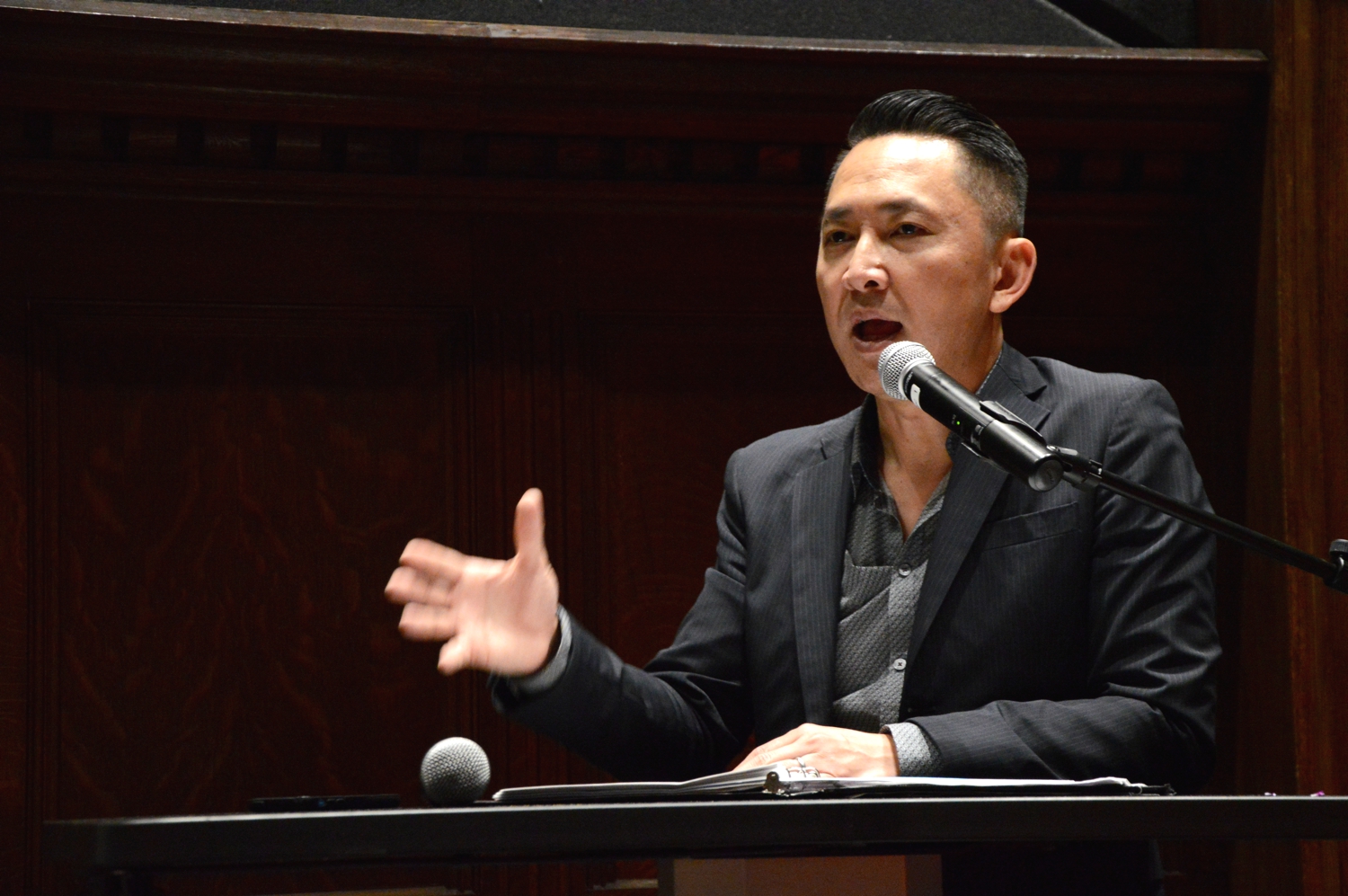Viet Nguyen, author of Pulitzer Prize winning novel “The Sympathizer,” spoke at 7 p.m., Tuesday, April 4 in Choi Auditorium. Nguyen broke the lecture into three parts, each for one of his three literary works: “The Sympathizer,” “Nothing Ever Dies” and “The Refugees.” Nguyen explained that his writing is inspired by his experience as a refugee from the Vietnam War. The English department and the Remsen Bird Fund sponsored the event. According to Leila Neti, head of the English department, planning for the event began in Fall 2016. The talk — drawing professors and students alike — concluded with a question and answer session. The event was intimate, with approximately 30 students, faculty members and community members in attendance.
“The Sympathizer” is a fiction novel focusing on the life of a half-Vietnamese, half-French man during the Vietnam War whose sole talent is being able to see both sides of any issue. The novel incorporates the narrator’s duality, both in identity and in political ideology, into the subtlest plot details. To Nguyen, this sense of duality was key to character development, but also to his own experiences as a Vietnamese refugee. Fleeing the war in Vietnam, the narrator lives in Southern California — and attends Occidental — trying to adjust to American life while remaining in contact with officials in the Vietnamese Communist Party until he eventually returns to Vietnam at the end of the novel.
Nguyen’s reference to Occidental serves as a metaphor that further highlights the theme of duality in “The Sympathizer.” In the book, Occidental represents the pinnacle of Westernness in the name and as an institution. “Occidental” refers to Western culture, an aspect of the narrator’s identity that he struggles with before leaving Vietnam. After moving to the US and studying at Occidental College, the narrator became “an expert in all manner of American studies” as he studied American history and literature, improved his English and learned American slang.
“[As] a man with two countries, I am constantly engaged with a sense of duality … Growing up, I felt that I was a spy in my parent’s household, they were Vietnamese and I was an American boy … When I would go outside of my household into the rest of American society, I felt that I was a Vietnamese spying on Americans,” Nguyen said.
Nguyen’s talk focused on the necessity of having writers tell their own stories — being honest about their feelings and writing stories for people with shared experiences. Nguyen’s emphasis on sharing personal experience was underscored by his personal history as a young child whose family fled Vietnam in the wake of the Vietnam War.
“What we’re doing as writers is to try to make America live up to its promises of the American Dream and the American ideals,” Nguyen said.
English major Rebecca Nicholson (sophomore) found Nguyen’s candidness and honesty inspiring.
“It made me interested in Vietnam’s history, and the community as a whole … It made me think about considering more than just my own perspective,” Nicholson said.
Nguyen spoke at length about his identity as a refugee, as opposed to an immigrant. A refugee, to Nguyen, is someone who involuntarily needs a new home. An immigrant, in contrast, is looking for new opportunities.
“When The Sympathizer first came out, there were a lot of reviews that called it an ‘immigrant novel,’ and called me an ‘immigrant writer,’ … To call me an immigrant, and to call this an immigrant novel, means that meaning of the novel and the meaning of my life can be channeled into the narrative of the American dream … To insist on being called a refugee means that I want to insist that the United States pay attention to these complicated histories,” Nguyen said.
Neti, who has known Nguyen since graduate school, thought the event was a success and appreciated appreciated Nguyen’s ability to recognize connections between refugee experiences while also honoring their unique circumstances.
“There was a strong sense of both the specificity of the Vietnamese experience, as well as an insistence that similar structures are at work in the refugee crisis of our contemporary moment.”
Nguyen’s talk was more than a summary of his novels and short stories. He also spoke about diversity in Hollywood, Hong Kong gangster movies as sources of inspiration and teaching at the University of Southern California. Nguyen focused on the difficulties of writing a book about a controversial and one-sided American historical event. Ethical memory, as he calls it, is the process of actively trying to look at the past objectively, paying attention to all involved. To Neti, this lesson of ethical memory is pertinent to our community.
“Ethical memory demands that we think not only of our individual or group experiences but also of how structures of power operate similarly across particular individuals or groups. I think as we continue to work toward creating a more ethical community at Oxy, and elsewhere, we need to keep our eye on structures, both within the institution and in the larger political realm. While structures shape and limit what it’s possible for us to imagine, understanding how they operate can provide a path toward meaningful intervention,” Neti said.
Have a tip? Email us at Weekly.oxy.edu or Tweet us @OxyWeekly
![]()




































